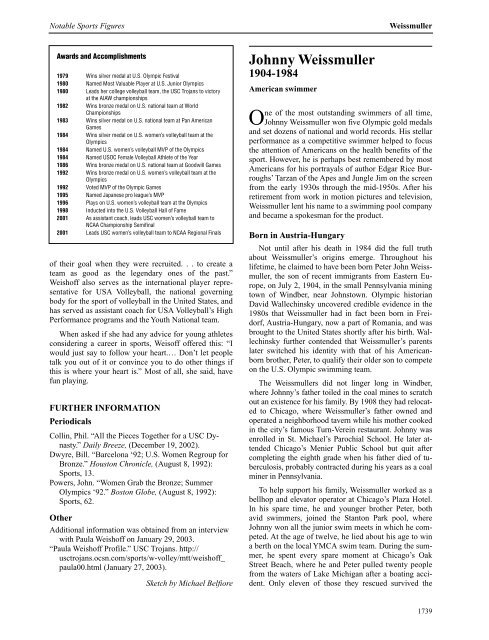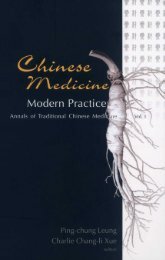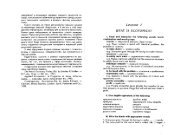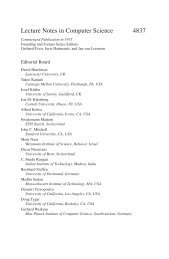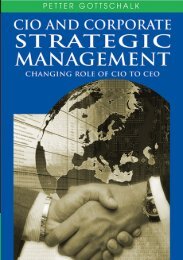Frank Thomas
Frank Thomas
Frank Thomas
You also want an ePaper? Increase the reach of your titles
YUMPU automatically turns print PDFs into web optimized ePapers that Google loves.
Notable Sports Figures<br />
Awards and Accomplishments<br />
1979 Wins silver medal at U.S. Olympic Festival<br />
1980 Named Most Valuable Player at U.S. Junior Olympics<br />
1980 Leads her college volleyball team, the USC Trojans to victory<br />
at the AIAW championships<br />
1982 Wins bronze medal on U.S. national team at World<br />
Championships<br />
1983 Wins silver medal on U.S. national team at Pan American<br />
Games<br />
1984 Wins silver medal on U.S. women’s volleyball team at the<br />
Olympics<br />
1984 Named U.S. women’s volleyball MVP of the Olympics<br />
1984 Named USOC Female Volleyball Athlete of the Year<br />
1986 Wins bronze medal on U.S. national team at Goodwill Games<br />
1992 Wins bronze medal on U.S. women’s volleyball team at the<br />
Olympics<br />
1992 Voted MVP of the Olympic Games<br />
1995 Named Japanese pro league’s MVP<br />
1996 Plays on U.S. women’s volleyball team at the Olympics<br />
1998 Inducted into the U.S. Volleyball Hall of Fame<br />
2001 As assistant coach, leads USC women’s volleyball team to<br />
NCAA Championship Semifinal<br />
2001 Leads USC women’s volleyball team to NCAA Regional Finals<br />
of their goal when they were recruited. . . to create a<br />
team as good as the legendary ones of the past.”<br />
Weishoff also serves as the international player representative<br />
for USA Volleyball, the national governing<br />
body for the sport of volleyball in the United States, and<br />
has served as assistant coach for USA Volleyball’s High<br />
Performance programs and the Youth National team.<br />
When asked if she had any advice for young athletes<br />
considering a career in sports, Weisoff offered this: “I<br />
would just say to follow your heart.… Don’t let people<br />
talk you out of it or convince you to do other things if<br />
this is where your heart is.” Most of all, she said, have<br />
fun playing.<br />
FURTHER INFORMATION<br />
Periodicals<br />
Collin, Phil. “All the Pieces Together for a USC Dynasty.”<br />
Daily Breeze, (December 19, 2002).<br />
Dwyre, Bill. “Barcelona ‘92; U.S. Women Regroup for<br />
Bronze.” Houston Chronicle, (August 8, 1992):<br />
Sports, 13.<br />
Powers, John. “Women Grab the Bronze; Summer<br />
Olympics ‘92.” Boston Globe, (August 8, 1992):<br />
Sports, 62.<br />
Other<br />
Additional information was obtained from an interview<br />
with Paula Weishoff on January 29, 2003.<br />
“Paula Weishoff Profile.” USC Trojans. http://<br />
usctrojans.ocsn.com/sports/w-volley/mtt/weishoff_<br />
paula00.html (January 27, 2003).<br />
Sketch by Michael Belfiore<br />
Johnny Weissmuller<br />
1904-1984<br />
American swimmer<br />
Weissmuller<br />
One of the most outstanding swimmers of all time,<br />
Johnny Weissmuller won five Olympic gold medals<br />
and set dozens of national and world records. His stellar<br />
performance as a competitive swimmer helped to focus<br />
the attention of Americans on the health benefits of the<br />
sport. However, he is perhaps best remembered by most<br />
Americans for his portrayals of author Edgar Rice Burroughs’<br />
Tarzan of the Apes and Jungle Jim on the screen<br />
from the early 1930s through the mid-1950s. After his<br />
retirement from work in motion pictures and television,<br />
Weissmuller lent his name to a swimming pool company<br />
and became a spokesman for the product.<br />
Born in Austria-Hungary<br />
Not until after his death in 1984 did the full truth<br />
about Weissmuller’s origins emerge. Throughout his<br />
lifetime, he claimed to have been born Peter John Weissmuller,<br />
the son of recent immigrants from Eastern Europe,<br />
on July 2, 1904, in the small Pennsylvania mining<br />
town of Windber, near Johnstown. Olympic historian<br />
David Wallechinsky uncovered credible evidence in the<br />
1980s that Weissmuller had in fact been born in Freidorf,<br />
Austria-Hungary, now a part of Romania, and was<br />
brought to the United States shortly after his birth. Wallechinsky<br />
further contended that Weissmuller’s parents<br />
later switched his identity with that of his Americanborn<br />
brother, Peter, to qualify their older son to compete<br />
on the U.S. Olympic swimming team.<br />
The Weissmullers did not linger long in Windber,<br />
where Johnny’s father toiled in the coal mines to scratch<br />
out an existence for his family. By 1908 they had relocated<br />
to Chicago, where Weissmuller’s father owned and<br />
operated a neighborhood tavern while his mother cooked<br />
in the city’s famous Turn-Verein restaurant. Johnny was<br />
enrolled in St. Michael’s Parochial School. He later attended<br />
Chicago’s Menier Public School but quit after<br />
completing the eighth grade when his father died of tuberculosis,<br />
probably contracted during his years as a coal<br />
miner in Pennsylvania.<br />
To help support his family, Weissmuller worked as a<br />
bellhop and elevator operator at Chicago’s Plaza Hotel.<br />
In his spare time, he and younger brother Peter, both<br />
avid swimmers, joined the Stanton Park pool, where<br />
Johnny won all the junior swim meets in which he competed.<br />
At the age of twelve, he lied about his age to win<br />
a berth on the local YMCA swim team. During the summer,<br />
he spent every spare moment at Chicago’s Oak<br />
Street Beach, where he and Peter pulled twenty people<br />
from the waters of Lake Michigan after a boating accident.<br />
Only eleven of those they rescued survived the<br />
1739


